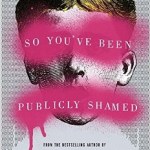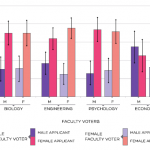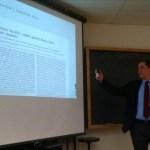society
Back before The Pip was born, our previous departmental administrative assistant used to bug me-- in a friendly way-- about how Kate and I ought to have another kid. (She had two kids of her own, about two years apart in age.) "When are you guys going to have another baby?" she would ask, and I always said "We're thinking about it."
About a week passed between the last time we had that exchange and the day I came in and taped ultrasound photos of the prenatal Little Dude to my door. "You sonofabitch!," she said (again, in a friendly way), "You were expecting this whole time!" "Yeah," I said…
When I was going through the huge collection of photos I have from the Forum in Rome, I kept running across pictures containing two young Asian women (neither of them Kate). This isn't because I was stalking them, but because they were everywhere, stopping for long periods in front of virtually every significant ruin and striking exaggerated poses for each other to take photos of. I had to carefully frame a few of my own photos to avoid them, but I did also take a few that deliberately included their posing, because it was so amusingly over the top.
Tourists taking photos of each other in…
The NPR program Here and Now has been running segments this week on Science in America, and one of these from yesterday featured me talking about science literacy. We had some technical difficulties getting this recorded-- it was supposed to happen at a local radio studio last week, but they had some kind of glitch, so instead we did it via Skype from my office on campus. (Where there was some sort of heavy equipment running outside my window before and after the interview, but miraculously, they took a coffee break for the crucial fifteen minutes of the actual call...)
You can listen to the…
I've had this piece by Rick Borchelt on "science literacy" and this one by Paige Brown Jarreau on "echo chambers" open in tabs for... months. I keep them around because I have thoughts on the general subject, but I keep not writing them up because I suspect that what I want to say won't be read much, and I find it frustrating to put a lot of work into a blog post only to be greeted by crickets chirping.
But, now I find myself in a position where I sort of need to have a more thought-out version of the general argument. So I'm going to do a kind of slapdash blog post working this out as I type…
As I go through my daily routine, I find myself sort of out of phase with a lot of the Internet. My peak online hours are from about six to ten in the morning, Eastern US time. That's when I get up, have breakfast, and then go to Starbucks to write for a few hours.
This means that most of the other people awake and active on my social media feeds are in Europe or Australia. And my standard writing time ends right around the time things start to heat up in the US. I do continue to have access to the Internet through the afternoon, of course, but unless I have a deadline coming up, I'm often…
Matt "Dean Dad" Reed is moving to New Jersey, and confronting one of the great dilemmas of parenting (also at Inside Higher Ed): what school district to live in. This is a big problem for lots of academics of a liberal sort of persuasion:
From a pure parental perspective, the argument for getting into the most high-achieving, “desirable” district we can afford is open-and-shut. TB and TG are wildly smart kids who will rise to the expected level; I want the level to be high. That strategy also has the benefit of higher resale value for a house, since other parents make the same calculation…
Engaging in a bit of tab clearance before I head off to DAMOP tomorrow afternoon, I noticed that I still had How to Teach an Ancient Rape Joke open. This is because while I found it kind of fascinating, it's not all that directly relevant to what I do, and I didn't have anything all that concrete to say beyond "Huh. That's interesting." So it languished in one of the many, many open tabs cluttering up Chrome, too interesting to just close but not anything I could see a clear angle to comment on. And eventually it was sort of forgotten until I set about paring down open tabs before an out-of-…
A few things about the academic job market have caught my eye recently, but don't really add up to a big coherent argument. I'll note them here, though, to marginally increase the chance that I'll be able to find them later.
-- First, this piece at the Guardian got a lot of play, thanks in part to the dramatic headline Science careers: doomed at the outset but even more thanks to the subhead "Has it become harder for graduate students to thrive, and are our best potential scientists giving up on academia?" Most of the people I saw re-sharing it used basically just that last clause, often…
Over the last month or so, it's been kind of hard to avoid this book, even before it hit stores. Big excerpts in the New York Times and The Guardian generated a good deal of buzz, and arguments on social media. Unsurprisingly, as one of the main elements of the book is a look at the phenomenon of social-media shaming, so anybody who had participated in or even watched one of these unfold had an opinion.
I've enjoyed Ronson's previous books a great deal, because he brings a real empathy to all the interviews and profiles he does. Even when he's profiling really problematic people, like some of…
I continue to struggle to avoid saying anything more about the Hugo mess, so let's turn instead to something totally non-controversial: gender bias in academic hiring. Specifically, this new study in the Proceedings of the National Academy of Science titled "National hiring experiments reveal 2:1 faculty preference for women on STEM tenure track" with this calm, measured abstract that won't raise any hackles at all:
National randomized experiments and validation studies were conducted on 873 tenure-track faculty (439 male, 434 female) from biology, engineering, economics, and psychology at…
Everybody and their extended families has been sharing around the Fareed Zakaria piece on liberal education. This, as you might imagine, is relevant to my interests. So I wrote up a response over at Forbes.
The basic argument of the response is the same thing I've been relentlessly flogging around here for a few years: that while I'm all for a broad education, the notion that studying a STEM subject and studying "the human condition" are in opposition or even cleanly separable is just foolish. But it's a great excuse to start that argument at Forbes, so...
I mentioned last week that I'm giving a talk at Vanderbilt tomorrow, but as they went to the trouble of writing a press release, the least I can do is share it:
It’s clear that this year’s Forman lecturer at Vanderbilt University, Chad Orzel, will talk about physics to almost anyone.
After all, two of his popular science books are How to Teach Physics to Your Dog and How to Teach Relativity to Your Dog. Orzel, an associate professor of physics at Union College in New York and author of the ScienceBlog “Uncertain Principles,” is scheduled to speak on campus at 3 p.m. Thursday, March 26.
As…
It's always a pleasure to see former students doing well, and to that end, we invited one of my former thesis students, Mike Mastroianni, class of 2007, to give a colloquium talk last week in the department. Mike went to physics grad school for a couple of years after graduation, but decided he was more interested in education issues, and is now in the process of writing his dissertation (to be defended in a few weeks) in a Curriculum and Instruction program at the University at Albany.
He gave a really interesting talk on his thesis work, looking at the evolution of gender ratios in STEM…
While I'm running unrelated articles head-on into each other, two other things that caught my eye recently were Sabine Hossenfelder's thoughts on scientific celebrities (taking off from Lawrence Krauss's defense of same) and Megan Garber's piece on "attention policing", spinning off that silliness about a badly exposed photo of a dress that took the Internet by storm.
Like Sabine, I'm generally in favor of the idea of science celebrities, though as someone whose books are found on shelves between Lawrence Krauss's and Neil deGrasse Tyson's, there's no small amount of self-interest in that.…
Back on Thursday when I was waiting to be annoyed by a speech, one of the ways I passed time was reading stuff on my phone, which included This Grantland piece about Charles Barkley and "advanced stats". In it, Bryan Curtis makes the argument that while Barkley's recent comments disparaging statistical tools seem at first like just the same old innumeracy, it's really a question of ownership.
But Barkley was firing a shot in a second war. Let’s call it Moneyball II. This clash doesn’t pit a blogger versus a newspaperman in a debate over the value of PER. It pits media versus athletes in a…
Yesterday was Founders Day at Union, celebrating the 220th anniversary of the granting of a charter for the college. The name of the event always carries a sort of British-boarding-school air for me, and never fails to earworm me with a very particular rugby song, but really it's just one of those formal-procession-and-big-speaker events that provide local color for academia.
This year's event started, as always, with a classical music performance-- a song by Aaron Copeland, this time, so we've at least caught up to the 20th Century. (I'm not sure I want to live long enough to see a Bob Dylan…
Jon "Men Who Stare at Goats" Ronson has a new book coming out, and has been promoting it with excerpts in major newspapers, most notably the New York Times Magazine and the Guardian. In these, he tracks down people whose lives were wrecked by massive public shaming campaigns over idiotic things they wrote on social media, and talks to them about what happened, and what they've been doing since.
Ronson's whole career is built around profiling unusual and often unpleasant people in a way that is ultimately sympathetic without endorsing their problematic aspects-- it belatedly occurs to me that…
A sort of follow-up to last week's post about the STEM "pipeline". In discussions on Twitter sparked by the study I talked about last week, I've seen a bunch of re-shares of different versions of this graph of the percentage of women earning undergrad degrees in physics:
Fraction of BA/BS degrees in physics awarded to women over time. From AIP Statistical Research.
You can clearly see that after a fairly steady rise through the 80's and 90's, this trend has flattened out over the last decade. If you crop the horizontal axis to start in the early 2000's, you can actually see a decline from…
I didn't see this before yesterday's post about Twitter, but over at SciLogs, Kirk Englehardt gets evangelical, offering a very chipper list of "Ten Reasons for Academic Researchers to Use Social Media." I'll just put the item headers here, though each of these has a more complete description, with links to lots of other stuff:
10. You’re in the Driver’s Seat
9. It’s About the Network
8. It’s Newsy and Trendy
7. Promotion (may) = Citations and Downloads
6. Spreading Your Love of Science
5. Setting the Record Straight
4. Sharing Interesting Things
3. Enhancing Your Research
2. It’s Easy
1. It…
Via Curt Rice (or, more precisely, somebody on Twitter who posted a link to that, but I didn't note who) there's a new study in Frontiers in Psychology of the STEM "pipeline", looking at the history of gender disparities in STEM degrees. You can spin this one of two ways, the optimistic one being "Women now continue on from bachelors degrees to Ph.D.'s at the same rate as men!" and the pessimistic one being, well, Rice's post.
The accurate description, as is often the case in social science, "This stuff is really messy and confusing." Rather than being a set of nice straight pipes going from…





